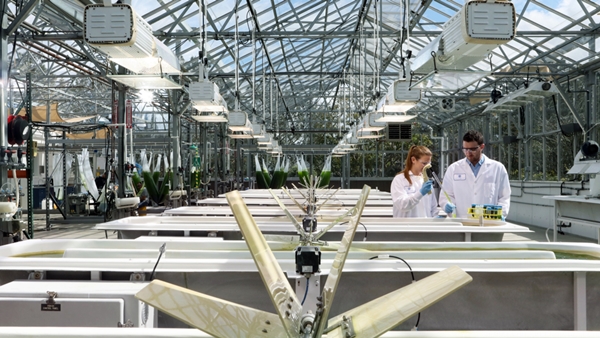19 June 2017. An industry biotechnology team created a genetically-engineered variety of algae that doubles its oil content without limiting its ability to grow. Researchers from Synthetic Genomics Inc. in LaJolla, California report their findings in today’s issue of the journal Nature Biotechnology (paid subscription required).
The Synthetic Genomics researchers are collaborating with oil company ExxonMobil to develop a variety of the algae species Nannochloropsis gaditana, or N. gaditana, as a feedstock for biofuels. Algae is considered a desirable feedstock candidate for biofuels since it does not need arable land or fresh water to grow, and can produce greater volumes of biofuels per acre than most other agricultural sources. Algae can also produce a fuel chemically similar to current transportation fuels, thus requiring less retooling of engines.
In addition, algae may be more beneficial than planted crops for controlling greenhouse gas emissions. Not only can algae absorb the greenhouse gas carbon dioxide when growing, it does not need the intensive farm management that often use fossil fuels during its lifecycle.
Sequencing the genome of N. gaditana in 2012 showed the species on its own has a high lipid, or natural oil, content. The Synthetic Genomics and ExxonMobil team sought to expand that oil-producing capability even further, which it discovered can be done by restricting starch and protein to the algae. However, limiting these nutrients also limits or even stops photosynthesis, which also stops growth of the species, making this approach unacceptable.
The researchers instead altered the genome of N. gaditana to increase its lipid content, while maintaining the species’s growing ability. The team first sequenced the RNA, proteins produced when the genetic code is transcribed into signals to the cells, from N. gaditanathen and identified 20 transcription proteins that restrict lipid content when deprived of nitrogen. Using the genome editing technique Crispr — short for clustered regularly interspaced short palindromic repeats — and the editing enzyme Cas9, the researchers reverse-engineered the genome by inserting mutations that negate 18 of the 20 transcription proteins.
Those mutations succeed in boosting the oil producing capacity of N. gaditana from 20 to 40 percent or more. Inhibiting another gene known to limit growth of the species enables N. gaditana to continue growing while still doubling its lipid amounts, according to tests reported by the researchers.
Today’s study, say the researchers, helps prove the concept of algae as a biofuel feedstock, but some challenges remain before algae is ready for large-scale fuel production. One of those challenges is the limited amount of light used by algae as it grows, with as little as 20 percent of sunlight on a pond absorbed. Further genetic engineering experiments are planned to address this issue. The researchers also expect to continue improving the output of oil from algae, expanding on the results published today.
More from Science & Enterprise:
- First Agricultural Crispr Products Expected by 2020
- Growing Engineered Algae Outdoors Shown Feasible, Safe
- Climate-Resistant Oilseed Crop Plant Developed
- RNA-Nanoparticle Spray Protects Against Plant Viruses
- Algae Feed Proposed to Enrich Farm Salmon Fatty Acids
Disclosure: The author owns shares in ExxonMobil.
* * *


 RSS - Posts
RSS - Posts
You must be logged in to post a comment.